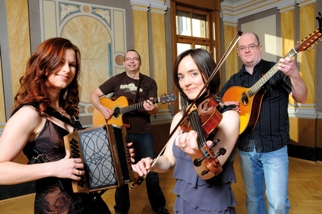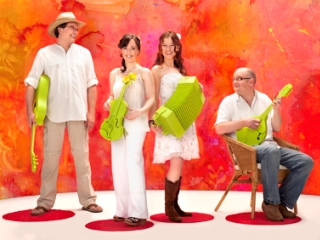Seán Laffey talks to Gudrun Walther of Litha.
Seán: Two years on from the 2duos and Gudrun was ready to launch a new album at Celtic Connections in Glasgow, so I wondered what can we expect to hear on the album?
Gudrun: Hi Sean. Greetings from the Alps from all Cara members! Although we are launching a new name and new album, we stuck with the original concept of the 2duos: being a cross-cultural band and bringing in all the influences from our individual musical and personal backgrounds. Aaron Jones’ family are from Northern Ireland but he now lived in Scotland for more than 20 years. So his music is both Irish and Scottish, and also he has a great love for contemporary songwriters and even played in a metal band!
Claire Mann grew up playing Irish music and competing in it as well, she holds three All-Irelands, but she also is deeply immersed in Scottish Music and was teaching at the Royal Academy in Glasgow for many years. She is still teaching at the University in Newcastle. I myself grew up singing and playing Irish and German trad in a house full of music, musicians and instruments. Juergen Treyz studied jazz guitar and played electric guitar for a good while until he discovered Breton music and shortly afterwards Irish music.
So on the album we combine all those musical styles and create our own sound with it.
How long did it take for you to put this second album together, and what was the process like?
We recorded two tracks (Blind George and Flying Dairymaids) during a tour in December 2010. Then we were incredibly busy, we all had different tours in different countries, and as a band we were part of the fantastic Irish Heartbeat tour through Germany alongside the Rapparees from Northern Ireland and the Sole Mates from the US. In July we got a great offer from a friend of Aaron's family who has a cottage in Kinvara, and we managed to get a week off for everybody and went to Kinvara to rehearse and arrange new material for the album. It was a great week, very inspiring and very luxurious to be in one place together and being able to just let it flow.
The band are famously 2 duos, but each member is doing all sorts of other stuff too, so how do you research, rehearse and refine the music?
We are very busy indeed and it isn't always easy, but with the blessings of modern technology we are able to stay in touch. Each duo has recording facilities in the house so we can record something and send it to each other and the others can add to it and send it back. This is just for arranging though! When we record an album, we much prefer the old-fashioned way of being in one room together and wherever possible we record live together. From the very beginning playing together felt very natural and things just fell into place. Luckily it still works like that and we don't need a lot of time or big discussions to decide how to play something.
How easy is it for Litha to perform together, with your own involvement with Cara that must be tricky?

We try and decide roughly a year in advance who is going to be touring when and where, and then we try to work with that schedule. It isn’t always easy because it’s not only Cara and Litha, it’s also Old Blind Dogs (Aaron’s band) and the other Cara musicians have other bands too – but so far it has worked well for us. I book most of the gigs for all of us in Germany and Europe and being in control and independent from an agency certainly helps with juggling the dates.
Because you are in many other musical outfits, how do you arrive at the sound and repertoire for Litha? How can you make it distinctive?
For me personally the German influence is very distinctive and sets Litha apart from Cara. Also the more contemporary choice of songs from Aaron's side is something that’s different to other bands we play in. Four part harmonies, twin fiddles and the great interplay of bouzouki and guitar are also ingredients that define the Litha sound for me...
I see that Cara have a following in the US and from your pictures with guns and a cowboy hat you seem to really enjoy life in the USA, will fans in America have a chance to catch Litha live this year?
We were playing this double bill gig in Colorado with Litha and Cara, and we were staying on a ranch where we could horse ride in the Rocky mountains... A lovely place. That’s why we dressed up in cowboy hats, and the guns are really just toy guns!! There is a tour planned with Cara for August/September, we have no plans for 2012 to go back with Litha. But you never know – if a festival asked us to come, we certainly would consider it.
Any plans to take Litha to Europe this spring?
Yes, we have a few dates lined up in our diary, there’s a short tour of Northern Germany at the end of March, some festivals in the summer and another tour in November.
Can you tell me how you came up with the name, Litha is Saxon for Midsummer, does this mean you will be drifting away from Celtic music and bringing in more Germanic ideas?

We first played music together at Wimborne Folk Festival in the South of England, and it was around Midsummer time. When we were looking for a name, this old term for the Midsummer feast popped up and we really liked the sound of it. It is a very happy time of the year and we just felt it fitted. German music will always be a part of what we do, but just one aspect of many.
I am sure our readers will be fascinated by the German tracks on the album, they are incredibly lyrical and have very well fashioned melodies. Are the tunes to those songs traditional or are they your own compositions? And can we find English translations on your web site?
The three German songs are “Mondlicht“, a poem by Theodor Storm, which I set to a new tune, the traditional “Nun will der Lenz uns grüßen“ and another poem by Johann Gottfried von Herder called “Herr Oluf“ which I set to music as well. Juergen came up with the lovely instrumental parts for all three songs. We will certainly consider to put all the lyrics and translations up on the website at some stage.
What are the songs about and how do they fit into the wider context of German folk songs?
Mondlicht means “moonlight“ and is a love song, “Nun will der Lenz uns grüßen“ is a traditional song about the coming of spring and how the people celebrate its coming, and “Herr Oluf“ is a ballad that can be traced back to Danish origins. It is about a guy who is going to be married, but on the evening before the wedding, the fairy queen invites him to dance with her, and he turns down her offer three times. She gets very angry and curses him – and the bride finds him dead the next morning!
One of the new tunes on the album is Winterreise, can you tell us a little more about this piece?
Juergen wrote “Winterreise“ (“winter journey“) in the car. Last year we had a phenomenal winter in Germany, with lots of snow, and he was driving through the wintry landscape and had that tune in his head. It starts off as a melancholic 5/4 waltz but takes up speed with a slightly blue-grassy guitar solo in the middle part.
Again looking at the German tradition, can you tell us something about those Bavarian dance tunes? Is there an active trad dance scene in Southern Germany and how do you think traditional dancers would react to your arrangements?
There is an active dance and music scene in Bavaria. Probably more active than anywhere else in Germany. They’ve kept traditions alive that were lost in other areas. Those dance tunes are “Zwiefache“ which literally translates “two-timed“ because of the constantly changing time signature. They were popular throughout South Germany. Each tune is a little different, and to dance to them the dancers have to know the tune. To make remembering them a little easier, people made up simple, often funny, sometimes dirty lyrics to them. Just recently I met a friend from Bavaria whose father is a bagpipe maker and plays Bavarian music, and he remembered the lyrics – so I have to get them off him soon!
Our set of tunes is danceable, although hard core traditionalists would maybe complain about mixing the four dance tunes with all those different time signatures... Normally you would play one, or two Zwiefache after each other, not four.
On the English song choices these are modern, Blind George, Waterlilly and Gypsy are all relatively new compositions, did you reject more traditional folk songs or have you found something special in these pieces that fit well into your musical armoury?
Blind George was written by Tim O’Leary who used to live with Aaron some years back. Aaron always liked the story, and so did we. It has a certain trad feel to it, because it is a story telling song. Waterlily wasn’t planned to be recorded, it was one that we always did on sessions when people were asking for a song. Then we started performing it on stage every now and again and loved it more and more until we decided to record it. Gypsy was a suggestion of Juergen, who always loved that song. So each of the songs has a story why we started singing it, and I guess Aaron was always more drawn to the singer-songwriter side. I love traditional songs as well, especially ballads, but I also like the contemporary songs, especially when they are such gems as Waterlily, Icarus or Gypsy. It wasn’t a conscious decision to only include one traditional song, but I guess it works very well and shaped the band sound.
Finally in this round of questions, THERE HAS TO BE A STORY behind the final track Ready for A Jar... can you tell us how it all happened?
We were in that house in Kinvara to rehearse for the new album. Three out of four band members are passionate hobby chefs, so we arrived with a roofbox full of food (and drink) and took great pride in cooking big meals in the evenings. So one day it was Juergen’s turn and we had a roast chicken with lemon and herbs in the oven. It was nearly done, but Juergen said it would need 20 more minutes and why wouldn’t we go for just one pint and then return to have dinner. The pub was literally next door, so we thought that was a brilliant idea. The Guinness was very tasty, and we had a great conversation, so we ordered another one... By the time we left the pub, I could hear a strange noise coming from the general direction of our house that turned out to be the fire alarm!! Luckily, the smoke coming out of the kitchen was still only the burning chicken and nothing else had caught fire, so we turned off the alarm, ensured the neighbours that it was only some bit of cooking which they thought was perfectly alright, and had mashed potatoes for dinner.
There’s far more than meat and potatoes in the music of Litha.
Photo Credits:
(1)-(4) Litha / 2duos (from website).